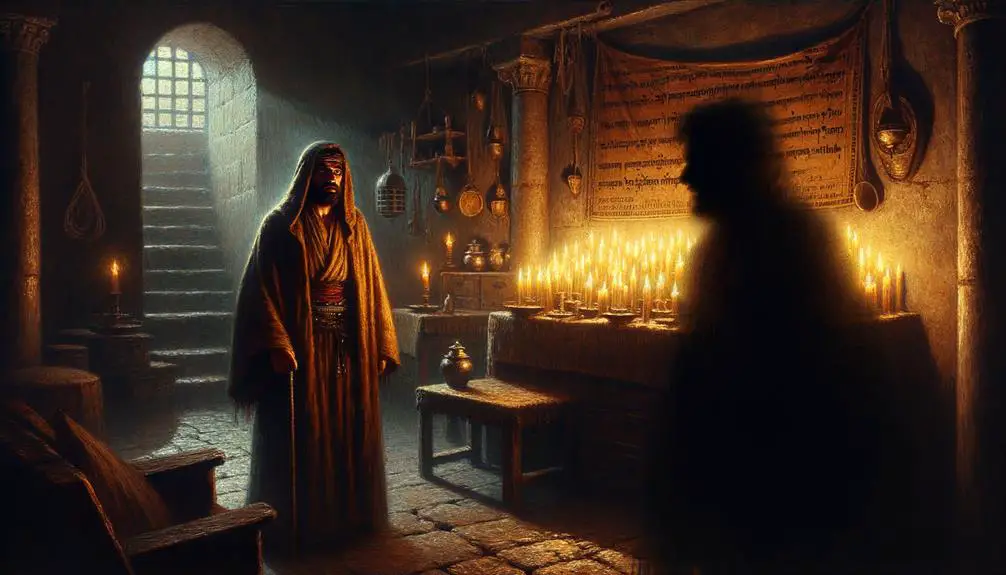Hidden in scripture, tales of molestation reveal struggles and resilience, urging a deeper exploration of their profound impacts.

Who Was Molested in the Bible
As you navigate through the ancient texts, the shadows of those who suffered molestation in the Bible emerge from the darkness, seeking the light of understanding.
You'll encounter the heart-wrenching stories of Dinah, Tamar, and others whose voices were silenced by their circumstances. Each narrative not only unveils the personal tragedies of these figures but also reflects broader societal issues that are still relevant today.
By exploring their stories, you're invited to consider the complex interplay of power, vulnerability, and the human spirit's resilience. Let's embark on this journey together, with an open mind and a compassionate heart, to uncover the lessons hidden within these ancient texts.
Key Takeaways
- Dinah and Tamar experienced sexual assault, underscoring the Bible's acknowledgment of such violence.
- Bathsheba was subjected to manipulation and abuse of power by King David.
- Victims like Tamar often faced injustice and lack of empathy, highlighting societal shortcomings.
- The narratives call for moral integrity, justice, and societal transformation in addressing sexual violence.
The Tragedy of Dinah

In the biblical narrative, Dinah's tragedy unfolds when she's violated by Shechem, an act that sparks a complex and devastating series of events for her and her family. This incident, deeply entwined in cultural context and family dynamics, offers a poignant insight into the societal norms and familial bonds of the time.
The cultural context surrounding Dinah's story is critical to understanding the gravity of her situation. In her era, a woman's virtue was highly prized, and any assault on it was seen not just as an affront to the individual but to her entire family. This perception amplifies the impact of Dinah's suffering, placing it at the intersection of personal trauma and communal dishonor. It's important to recognize how these cultural values dictate the responses of those involved, shaping the narrative in a way that highlights the complexities of honor, vengeance, and reconciliation.
Family dynamics play an equally crucial role in this narrative. Dinah's brothers' reaction to her violation—deception followed by the violent revenge against Shechem and his city—underscores the intensity of familial loyalty and the lengths to which they'd go to avenge their sister's dishonor. Yet, this act of retribution also opens up questions about justice, morality, and the perpetuation of violence. The family's response, while rooted in the desire to uphold Dinah's honor, sets off a chain of events that further complicates the tragedy, revealing the multifaceted nature of human relationships and the consequences of actions driven by cultural convictions and familial ties.
Tamar's Desolation
You'll find Tamar's story in the Bible to be a poignant illustration of the dire consequences of sexual assault and the complex quest for justice that often follows.
Her tragic encounter not only led to immediate personal desolation but also highlighted the societal challenges she faced in seeking retribution and acknowledgment.
The aftermath of the assault and the denied justice she encountered serve as critical points for us to consider, especially in understanding the historical and cultural context of such narratives.
Tamar's Tragic Encounter
Tamar's tragic encounter unfolds as she becomes a victim of sexual assault by her half-brother Amnon, a narrative that starkly highlights the vulnerabilities and injustices faced by women in biblical times.
This incident, deeply entangled in royal dynamics, reveals the complexities of familial power and its misuse within the palace walls. The cultural norms of the era, which often left women with little agency or recourse, further exacerbated Tamar's desolation.
Her story is a poignant examination of the intersection between personal trauma and the broader societal frameworks that enable such acts. It serves as a critical reflection on how power dynamics and cultural expectations can conspire to silence and marginalize victims, making Tamar's ordeal a timeless lesson on the necessity of justice and empathy in addressing sexual violence.
Aftermath of Assault
Reflecting on the harrowing narrative of Tamar's assault, it becomes apparent that the aftermath of such violence leaves deep, enduring scars on its victims, shaping their lives in profound and often devastating ways. The desolation Tamar endured underscores the critical need for effective healing processes and robust support mechanisms.
Victims like Tamar are thrust into a long, arduous journey towards recovery, navigating through the trauma that seeps into every facet of their existence. Healing isn't linear; it ebbs and flows, requiring a network of emotional, psychological, and sometimes physical support. The story highlights the importance of understanding and addressing the multifaceted impacts of assault.
Without adequate support mechanisms, the path to healing remains a daunting challenge, emphasizing the need for compassionate, comprehensive care for survivors.
Seeking Justice Denied
In the wake of her assault, Tamar found herself grappling with a justice system that turned its back on her, underscoring the bitter reality many survivors face when seeking redress. Her story illuminates the urgent need for legal reforms and a shift in cultural attitudes towards victims of sexual violence.
Aspect |
Impact on Tamar's Case |
|---|---|
Legal Reforms |
Lacked mechanisms for justice |
Cultural Attitudes |
Stigmatized, isolating victims |
Immediate Response |
Dismissal and disbelief |
Long-term Support |
Nonexistent, leading to desolation |
Public Perception |
Victim-blaming, further trauma |
Tamar's desolation serves as a poignant reminder of the systemic failures that continue to hinder justice for survivors, urging society to reflect and act on the necessary changes.
The Levite's Concubine
You'll find the story of the Levite's concubine to be a harrowing tale of abuse and its ripple effects on a community.
This narrative not only uncovers a tragic event but also prompts you to consider how society reacted and the profound aftermath it had.
Tragic Event Unfolded
One of the most harrowing narratives within the biblical texts involves the Levite's concubine, whose tragic fate unfolds in Judges chapters 19 through 21. This story not only narrates a personal tragedy but also sheds light on the cultural implications and psychological effects of such an event on the individuals and society at that time.
Aspect |
Analysis |
|---|---|
Cultural Implications |
Highlighted through societal norms and the treatment of women, reflecting a period of moral and social complexity. |
Psychological Effects |
The ordeal leaves lasting impacts, not just on the victim, but also on the wider community, prompting a cycle of violence and retribution. |
Narrative Purpose |
Serves as a critique of societal failures, emphasizing the need for justice and moral integrity. |
Historical Context |
Provides insight into ancient societal structures and the position of women within them. |
This story serves as a poignant reminder of the consequences of societal neglect and moral decay.
Society's Reaction Explored
Reflecting on the tragic narrative of the Levite's concubine, society's response reveals a complex web of moral outrage, collective shame, and a call to action that ultimately shapes the course of the subsequent events. This incident, deeply embedded within ancient texts, offers a window into the societal norms and values of the time.
Cultural interpretations of this story have evolved, reflecting broader changes in perceptions of morality, justice, and gender roles. Modern reflections on this narrative often focus on the themes of victimization and the societal mechanisms that enable such tragedies.
This analysis invites a reevaluation of historical contexts, encouraging a dialogue that bridges past and present understandings. It's a reminder that the echoes of the past still resonate in today's discussions about justice, accountability, and the protection of the vulnerable.
Aftermath and Impact
In the aftermath of the Levite's concubine's tragic ordeal, the ripple effects throughout the community ignited a fervent call for justice and reevaluation of societal norms.
This incident, steeped in violence and betrayal, underscored the urgent need for healing processes that not only cater to individual trauma but also address the collective wounds inflicted upon the community. It showcased the dire consequences of societal norms that devalue and marginalize individuals, compelling a critical introspection into the fabric of societal ethics and moral obligations.
The tragedy of the Levite's concubine became a catalyst for change, inspiring a movement towards a more empathetic and inclusive society. It insisted on the importance of safeguarding all members of the community, leading to a profound transformation in societal norms and attitudes.
Bathsheba's Predicament
Bathsheba's predicament unfolds as she becomes the object of King David's desire, leading to significant moral and ethical dilemmas within the biblical narrative. This story is steeped in royal intrigue and power dynamics, presenting a complex situation where Bathsheba finds herself ensnared by the desires of a king, highlighting how power can corrupt and lead to moral downfall.
The account of Bathsheba and King David raises several points of discussion concerning the misuse of power and its consequences:
- Abuse of Royal Power: David uses his position as king to summon Bathsheba, demonstrating how authority can be exploited for personal gain.
- Lack of Consent: Bathsheba's ability to consent is severely compromised, given the power imbalance between her and David.
- Manipulation of Circumstances: David orchestrates the death of Bathsheba's husband, Uriah, further entangling her in his web of deceit and manipulation.
- The Ripple Effect of Actions: The consequences of David's actions extend beyond Bathsheba, affecting the entire kingdom and leading to familial strife and conflict within David's own household.
This episode not only highlights the vulnerabilities of individuals within a patriarchal society but also serves as a cautionary tale about the dangers of unchecked power. Bathsheba's story, while deeply personal, also reflects broader themes of exploitation and the quest for redemption. Through this narrative, the Bible exposes the complexity of human nature, emphasizing the need for accountability, especially among those in positions of power.
Joseph's Refusal

Joseph's steadfast refusal to succumb to the advances of Potiphar's wife showcases a remarkable display of moral integrity and personal resolve within a complex web of temptation and power dynamics. You're witnessing an individual who, despite being in a vulnerable position as a slave, navigates through a perilous situation with unwavering ethical firmness. This encounter not only highlights the power dynamics at play but also sets the stage for Joseph's later prominence in Egypt, largely due to his gift for dream interpretations.
The story unfolds in a setting where Joseph, despite his lowly position, possesses an extraordinary character that ultimately leads to his rise. His refusal is not just about resisting a moral wrong; it's about asserting his integrity against immense pressure. This act of defiance puts him in dire straits but also seeds his future success.
Aspect |
Detail |
|---|---|
Moral Integrity |
Joseph's unwavering commitment to ethics |
Power Dynamics |
The imbalance between Joseph and Potiphar's wife |
Temptation |
The persistent advances from Potiphar's wife |
Personal Resolve |
Joseph's firm refusal despite consequences |
Future Success |
Paved by his moral stand and dream interpretations |
Analyzing Joseph's refusal, you delve into a narrative rich with themes of morality, power, and destiny. His ability to interpret dreams, which becomes crucial later, is foreshadowed here, not just as a plot point but as a testament to his unique capabilities and divine favor. Joseph's story teaches you the value of steadfastness and integrity, even when faced with seemingly insurmountable challenges.
Amnon and Tamar
Shifting our focus to another harrowing narrative, we encounter the distressing tale of Amnon and Tamar, which unravels themes of betrayal, power abuse, and the devastating consequences of unbridled desire. This story, deeply embedded in the annals of biblical history, serves as a poignant reminder of how royal dysfunction and the flouting of societal norms can lead to catastrophic outcomes.
You're drawn into a world where Amnon, driven by an obsessive lust for his half-sister Tamar, devises a deceitful plan to be alone with her. Under the guise of illness, he requests her presence to nurse him back to health, a request that culminates in her sexual assault. This act not only devastates Tamar but also sets off a chain of events that highlight:
- The misuse of power and trust within a family.
- The stark consequences of violating societal norms and personal boundaries.
- The silence and complicity that often follow such transgressions, further victimizing the assaulted.
- The ripple effect of one violent act, leading to familial strife and revenge.
Through this narrative, you're compelled to reflect on the dynamics of power, the sanctity of consent, and the long-lasting impact of such violations on individuals and their communities. It's a sobering examination of the ways in which societal norms can be upended by those in positions of power, and a call to recognize and address the underlying issues of royal dysfunction and moral decay.
Frequently Asked Questions
How Did the Communities and Families React to the Victims After the Incidents Were Revealed in the Biblical Narratives?
When communities and families learned of the victims' experiences, reactions varied significantly. Often, there was community retaliation against the perpetrators, reflecting a collective sense of justice and protection.
At times, divine interventions played a crucial role in addressing the injustices, showcasing a broader moral and ethical compass at work. These responses highlighted the importance of support and accountability within these narratives, emphasizing the community's role in healing and justice.
Were There Any Long-Term Psychological Impacts Mentioned or Implied for the Victims in These Biblical Accounts?
When exploring narratives that involve trauma, it's crucial to consider whether there's mention or implication of long-term psychological impacts on the victims.
You're likely curious about victim resilience and emotional healing. While these accounts mightn't explicitly detail psychological effects, analyzing the subtleties can offer insights into the resilience displayed and any paths toward emotional healing taken.
Understanding these aspects requires a respectful and analytical approach to grasp the depth of the experiences shared.
How Do Modern Interpretations of These Biblical Stories Differ From Traditional Views, Especially Concerning Victim Support and Justice?
Modern interpretations of these stories have evolved significantly from traditional views, thanks to a deeper understanding of cultural context and interpretive evolution.
You'll find that nowadays, there's a stronger emphasis on victim support and justice, reflecting society's growing awareness of these issues.
It's fascinating to see how perspectives shift over time, bringing new insights that challenge old narratives, all the while maintaining a respectful and analytical approach to these sensitive topics.
Are There Any Lesser-Known Biblical Figures Who Experienced Similar Situations but Are Not Widely Discussed in Religious Teachings or Literature?
You're exploring figures in religious texts who've faced adversity, yet aren't typically highlighted. Delving into historical contexts and cultural interpretations, you'll uncover stories not widely shared in teachings or literature.
This analysis respects the delicacy of these narratives while providing detailed insights. By examining lesser-known individuals, you'll gain a deeper understanding of how their experiences reflect broader societal issues, contributing to a more nuanced appreciation of these ancient texts.
How Have These Stories Influenced Contemporary Religious Discussions on Consent, Sexual Violence, and Victim Shaming?
You're exploring how stories of sexual violence have shaped modern discussions on consent and victim support. These narratives have led to the adoption of modern therapy approaches, emphasizing healing and resilience.
They've also played a crucial role in reducing societal stigma around discussing sexual violence. By openly addressing these issues, religious communities are fostering a more supportive environment, challenging victim shaming, and promoting a deeper understanding of consent.
Conclusion
In analyzing these biblical narratives, it's clear that they shed light on the harsh realities of sexual misconduct across different contexts. Take Dinah's story, for instance. It's not merely an ancient account but mirrors modern-day tragedies where victims often struggle with voicelessness and societal neglect.
These stories, while deeply unsettling, encourage a nuanced understanding of victimhood and resilience. They compel us to look beyond the surface, recognizing the enduring strength and dignity of those who've suffered.



Sign up